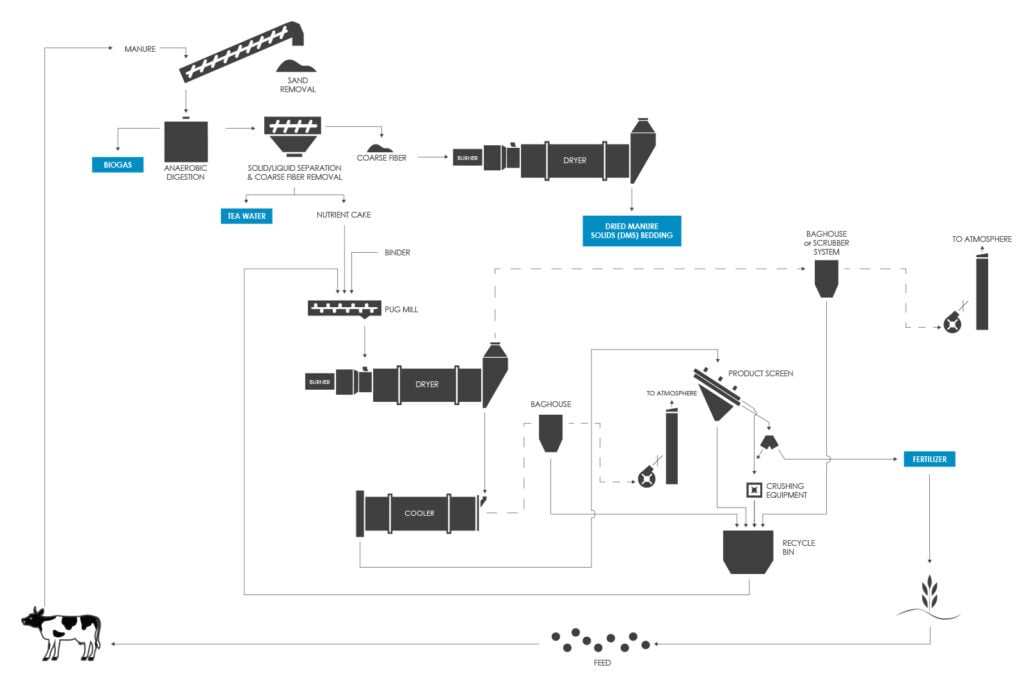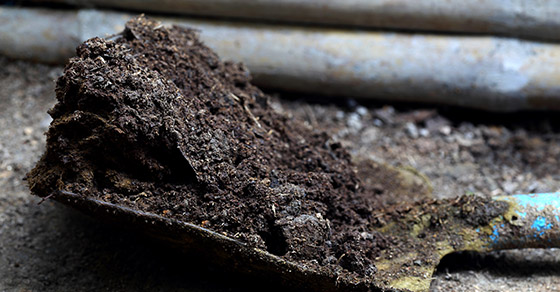As large farms become the future of agriculture, the need for sustainable solutions in managing manure is becoming an ever-increasing focus.
However, while large farms are learning to deal with the amount of manure they produce, significant opportunity lies in processing manure to produce products that can be used on-farm, reducing costs and offering improved sustainability.
The following will look at the opportunity that exists for large farms to take a more integrated approach to manure management.
Manure: A Wealth of Products
While farmers have long known about the benefits that manure can offer to soil, new technologies are making utilizing manure to its fullest potential even more possible, and not just for soil nutrient management.
With one all-encompassing process, the complete utilization of manure can create four products, significantly reducing on-farm costs, providing additional sources of revenue, and creating a sustainable, closed-loop system of self-sufficiency.
An overview of this process is provided here.
Step 1: Anaerobic Digestion
Product Yielded: Biogas
Anaerobic digestion is the first step in transforming manure into a fertilizer or bedding product.
Anaerobic digestion is a natural process that uses microbial activity to break down organic materials in the absence of oxygen. Two materials result from this process:
Biogas: A methane gas that can be converted into electricity to be used on-farm, or sold back to the energy grid.
Slurry: The homogenized slurry remaining is rich in nutrients and organic matter, but offers reduced bacteria and odor. This is the base material for creating fertilizer and/or bedding products.
Step 2: Solid/Liquid Separation
Potential Products Yielded: Tea Water, Recycled Manure Solids, Nutrient Rich Cake
Once manure has gone through anaerobic digestion, the remaining slurry must go through a solid/liquid separation process before it can move on to subsequent processing for use as a fertilizer or bedding. This can be carried out using a number of different methods. Some of the more advanced systems available typically yield three materials, depending on the process used: A nutrient rich cake, tea water, and coarse fibers/recycled manure solids.
Nutrient Rich Cake: The nutrient rich cake is a concentrated, cake-like material made up of organic matter and nutrients. This is the base of any subsequent fertilizer products.
Tea Water: Tea water is the remaining liquid portion that has been separated from the solids. This non-potable water has been stripped of much of the nutrients and is acceptable for use in irrigation, or other non-potable uses. It’s worth noting that additional processing to make this into potable water is available.
Coarse Fibers: Coarse fibers are the large fibers that have been separated out because they are unfit for granulation. And while they can’t be utilized in a fertilizer product, they are a suitable option for livestock bedding.
Step 3: Granulation
Product Yielded: A Premium Fertilizer Product
The nutrient cake recovered from the solid/liquid separation process can now be processed into a fertilizer through the process of granulation. Material preparation and the actual granulation process may differ depending on the characteristics of the unique sample at hand. The diagram below illustrates one common approach.
The nutrient cake is fed into a pugmill mixer (paddle mixer) where it is combined with dried recycle. Here, the action of the mixer, combined with a binding agent, agglomerates the material into round granules. The granules exit the pugmill mixer and are fed into a rotary dryer where they are dried to their final moisture content. The tumbling action of the dryer further rounds and “polishes” the granules. Granules are then cooled in a rotary cooler. A screen following the cooler separates over- and under-size product from on-size product. On-size product moves on to storage, packaging, transportation, or use as a fertilizer on-farm, while over-size is crushed down, combined with the under-size, and fed back into the process as recycle.
The granulation process is highly customizable; minerals and other additives can be included in the process to produce custom formulations and fertilizer blends. Granules produced by this process are considered a premium product.
Step 4: Coarse Fiber/Recycled Manure Solids Drying
Product Yielded: Dried Manure Solids Bedding
The coarse fibers left over from the solid/liquid separation process, also considered recycled manure solids, can now be used as a bedding material. Use of recycled manure solids for bedding is growing in popularity as traditional sources of bedding become increasingly costly and difficult to get.
Because the recycled manure solids have gone through anaerobic digestion, they are reduced in odor and pathogen content. However, some farms are finding that they can improve the quality of their milk by further improving the quality of their bedding. For this reason, many farms are looking to dry their recycled manure solids into dried manure solids.
While this can be done by composting material, a controlled drying approach may be more suitable. FEECO offers a controlled drying method that allows the moisture and pathogen content to be brought down to sufficient levels, without over-drying material to the point that it becomes dusty. This also avoids the risk of fostering bacterial growth that can be associated with a less controlled approach, such as composting.

Above: The diagram above illustrates the closed-loop approach to manure management discussed here. Click to view larger.
As the importance of sustainability in agriculture continues to become a global focus, an integrated approach to manure management will likely play a key role. The opportunity to use manure to its fullest potential alleviates many of the economic and environmental challenges farmers are faced with today.
FEECO has been serving the fertilizer and agriculture industry since 1951. We offer process design, custom equipment, and parts and service support for both organic and inorganic applications, as well as bedding recovery. From material testing, to bedding dryers, and even complete granulation systems, FEECO’s capabilities are unmatched.

